15 to动词短语-高中英语高频动词短语速记
文档属性
| 名称 | 15 to动词短语-高中英语高频动词短语速记 | 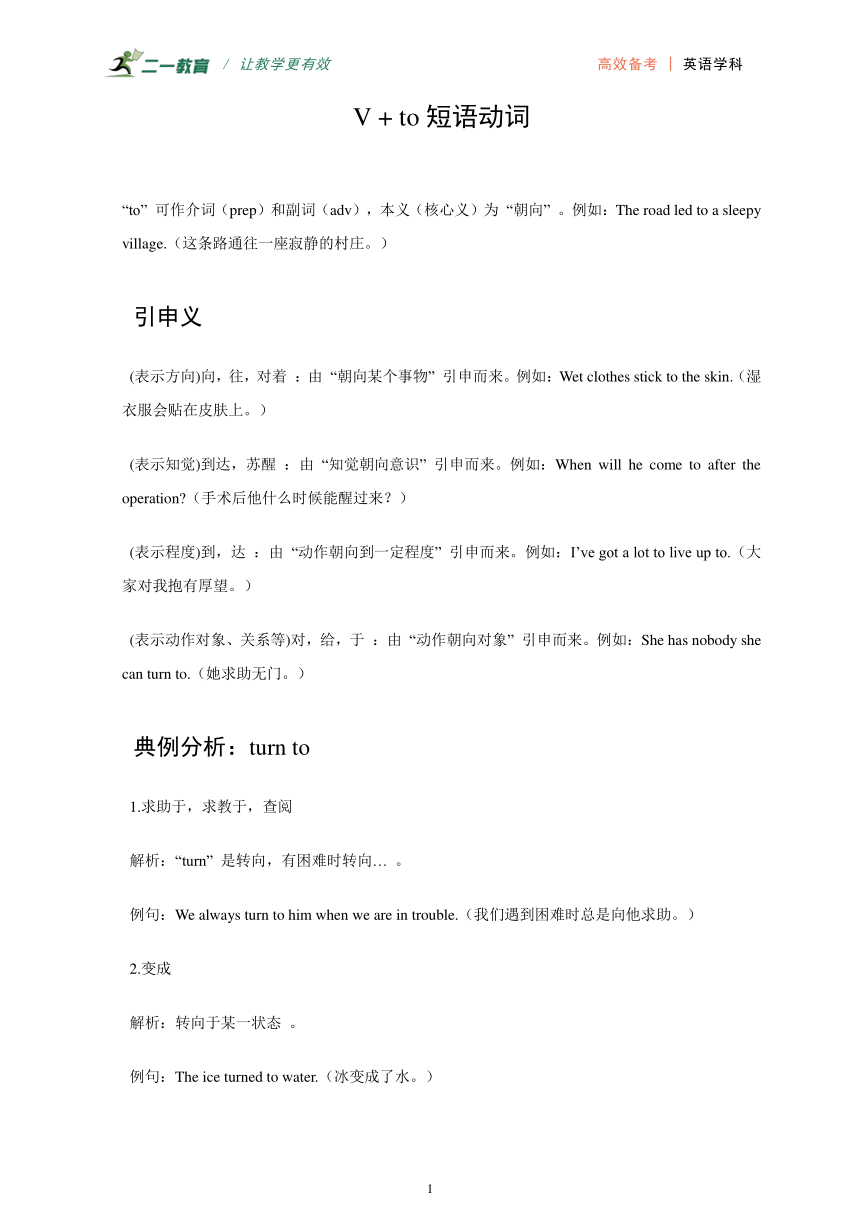 | |
| 格式 | docx | ||
| 文件大小 | 286.2KB | ||
| 资源类型 | 试卷 | ||
| 版本资源 | 通用版 | ||
| 科目 | 英语 | ||
| 更新时间 | 2025-04-29 16:21:26 | ||
图片预览

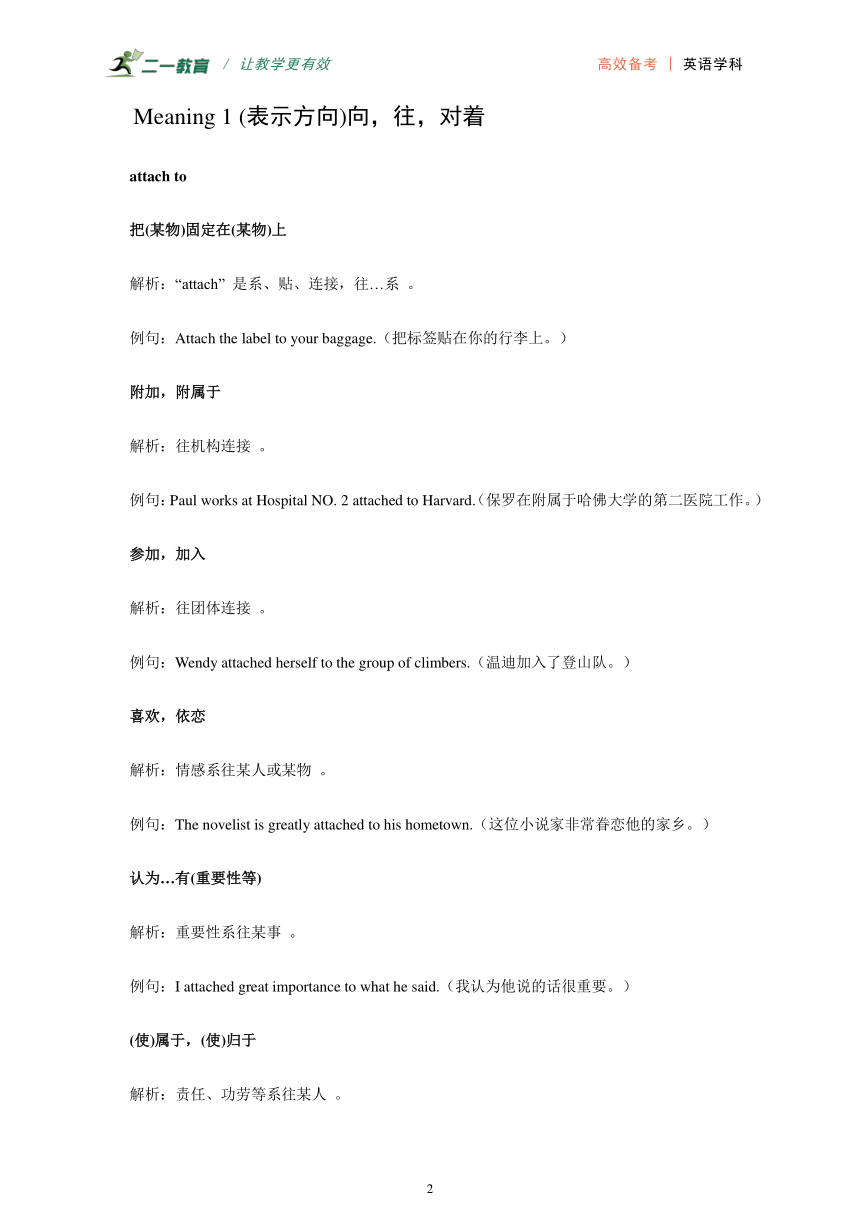
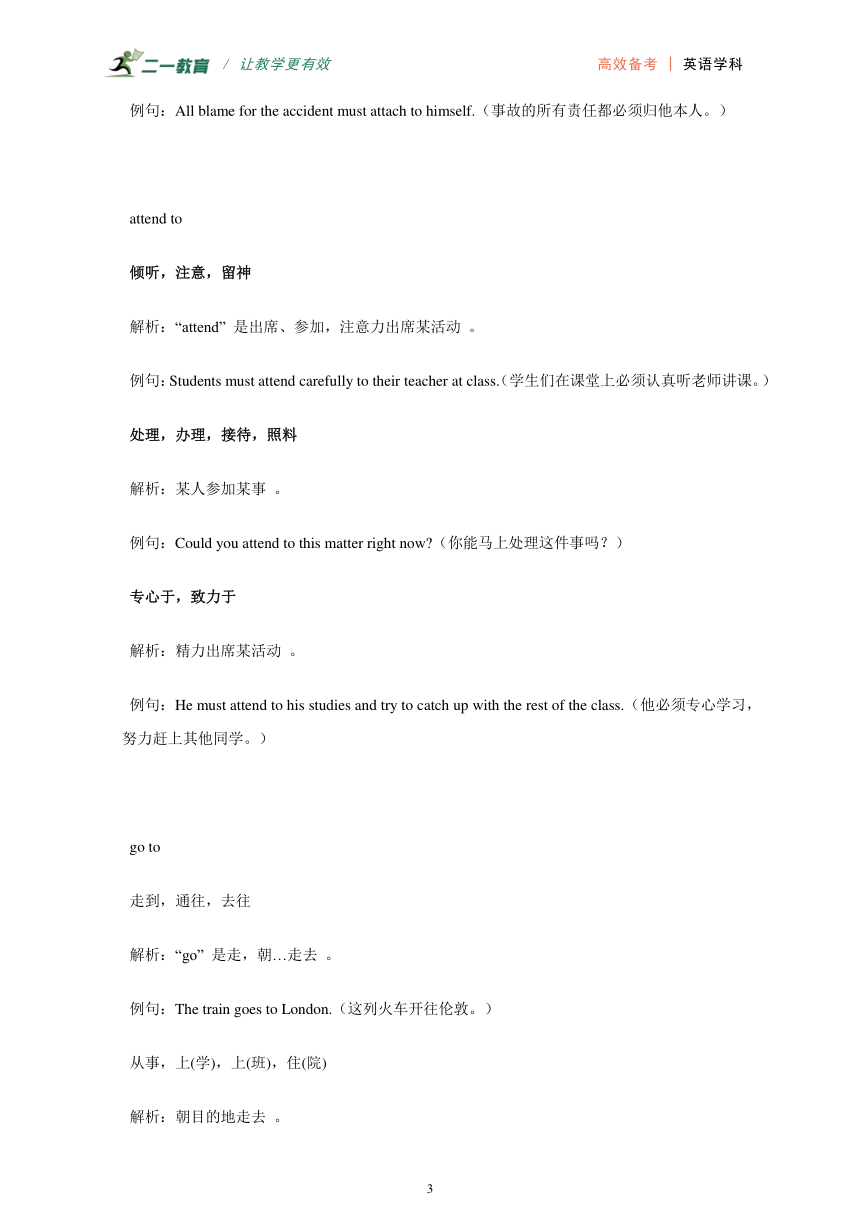
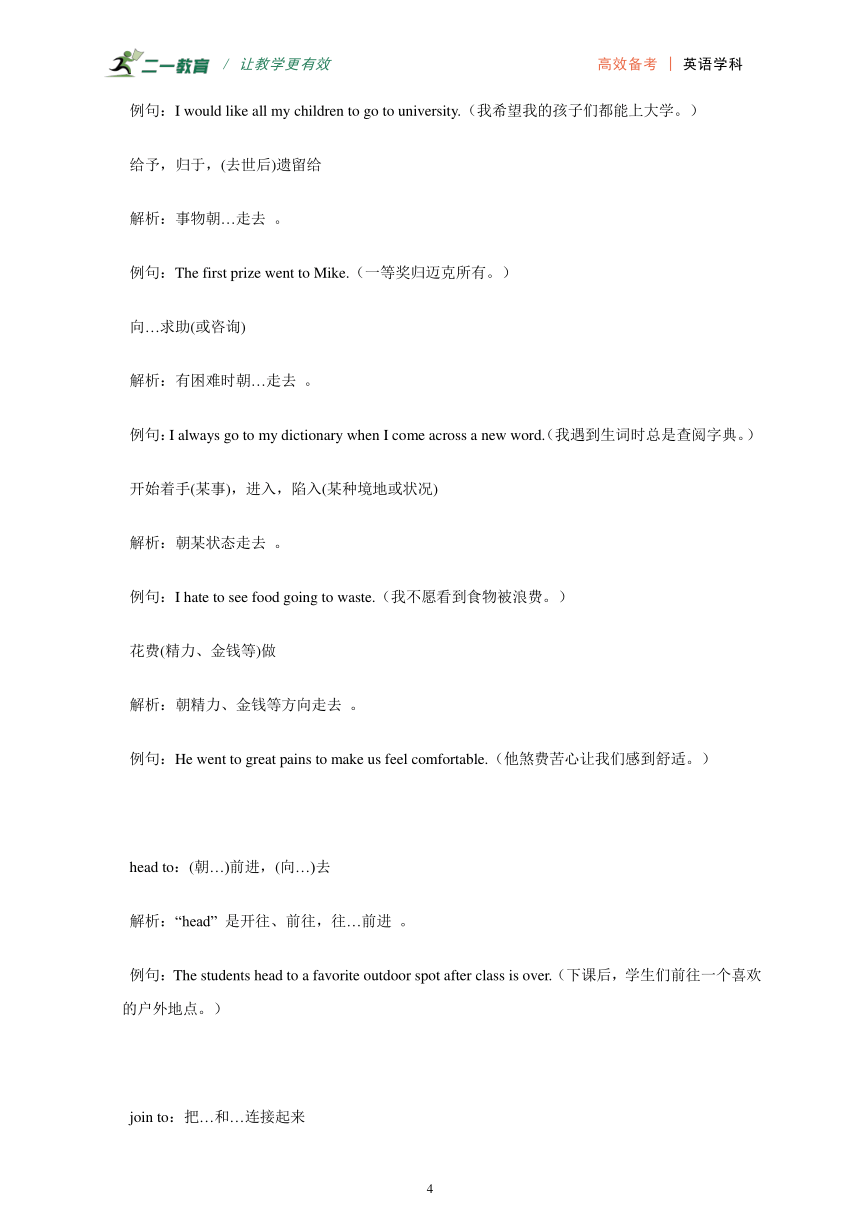
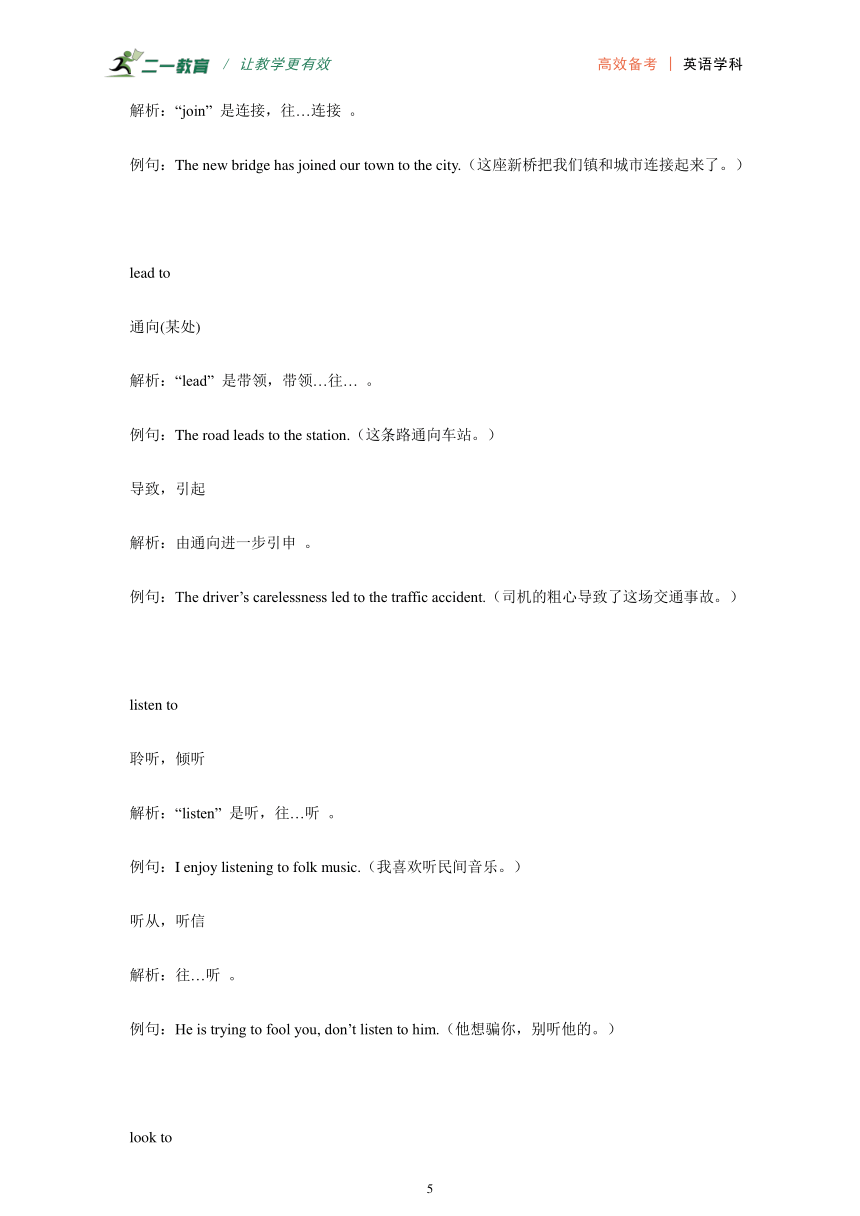
文档简介
/ 让教学更有效 高效备考 | 英语学科
V + to短语动词
“to” 可作介词(prep)和副词(adv),本义(核心义)为 “朝向” 。例如:The road led to a sleepy village.(这条路通往一座寂静的村庄。)
引申义
(表示方向)向,往,对着 :由 “朝向某个事物” 引申而来。例如:Wet clothes stick to the skin.(湿衣服会贴在皮肤上。)
(表示知觉)到达,苏醒 :由 “知觉朝向意识” 引申而来。例如:When will he come to after the operation (手术后他什么时候能醒过来?)
(表示程度)到,达 :由 “动作朝向到一定程度” 引申而来。例如:I’ve got a lot to live up to.(大家对我抱有厚望。)
(表示动作对象、关系等)对,给,于 :由 “动作朝向对象” 引申而来。例如:She has nobody she can turn to.(她求助无门。)
典例分析:turn to
1.求助于,求教于,查阅
解析:“turn” 是转向,有困难时转向… 。
例句:We always turn to him when we are in trouble.(我们遇到困难时总是向他求助。)
2.变成
解析:转向于某一状态 。
例句:The ice turned to water.(冰变成了水。)
Meaning 1 (表示方向)向,往,对着
attach to
把(某物)固定在(某物)上
解析:“attach” 是系、贴、连接,往…系 。
例句:Attach the label to your baggage.(把标签贴在你的行李上。)
附加,附属于
解析:往机构连接 。
例句:Paul works at Hospital NO. 2 attached to Harvard.(保罗在附属于哈佛大学的第二医院工作。)
参加,加入
解析:往团体连接 。
例句:Wendy attached herself to the group of climbers.(温迪加入了登山队。)
喜欢,依恋
解析:情感系往某人或某物 。
例句:The novelist is greatly attached to his hometown.(这位小说家非常眷恋他的家乡。)
认为…有(重要性等)
解析:重要性系往某事 。
例句:I attached great importance to what he said.(我认为他说的话很重要。)
(使)属于,(使)归于
解析:责任、功劳等系往某人 。
例句:All blame for the accident must attach to himself.(事故的所有责任都必须归他本人。)
attend to
倾听,注意,留神
解析:“attend” 是出席、参加,注意力出席某活动 。
例句:Students must attend carefully to their teacher at class.(学生们在课堂上必须认真听老师讲课。)
处理,办理,接待,照料
解析:某人参加某事 。
例句:Could you attend to this matter right now (你能马上处理这件事吗?)
专心于,致力于
解析:精力出席某活动 。
例句:He must attend to his studies and try to catch up with the rest of the class.(他必须专心学习,努力赶上其他同学。)
go to
走到,通往,去往
解析:“go” 是走,朝…走去 。
例句:The train goes to London.(这列火车开往伦敦。)
从事,上(学),上(班),住(院)
解析:朝目的地走去 。
例句:I would like all my children to go to university.(我希望我的孩子们都能上大学。)
给予,归于,(去世后)遗留给
解析:事物朝…走去 。
例句:The first prize went to Mike.(一等奖归迈克所有。)
向…求助(或咨询)
解析:有困难时朝…走去 。
例句:I always go to my dictionary when I come across a new word.(我遇到生词时总是查阅字典。)
开始着手(某事),进入,陷入(某种境地或状况)
解析:朝某状态走去 。
例句:I hate to see food going to waste.(我不愿看到食物被浪费。)
花费(精力、金钱等)做
解析:朝精力、金钱等方向走去 。
例句:He went to great pains to make us feel comfortable.(他煞费苦心让我们感到舒适。)
head to:(朝…)前进,(向…)去
解析:“head” 是开往、前往,往…前进 。
例句:The students head to a favorite outdoor spot after class is over.(下课后,学生们前往一个喜欢的户外地点。)
join to:把…和…连接起来
解析:“join” 是连接,往…连接 。
例句:The new bridge has joined our town to the city.(这座新桥把我们镇和城市连接起来了。)
lead to
通向(某处)
解析:“lead” 是带领,带领…往… 。
例句:The road leads to the station.(这条路通向车站。)
导致,引起
解析:由通向进一步引申 。
例句:The driver’s carelessness led to the traffic accident.(司机的粗心导致了这场交通事故。)
listen to
聆听,倾听
解析:“listen” 是听,往…听 。
例句:I enjoy listening to folk music.(我喜欢听民间音乐。)
听从,听信
解析:往…听 。
例句:He is trying to fool you, don’t listen to him.(他想骗你,别听他的。)
look to
照管,留心
解析:“look” 是看,向事物看 。
例句:You should look to your health.(你应该注意自己的健康。)
指望,依靠
解析:有困难时向某人看希望得到帮助 。
例句:The child looked to his mother to cure his hurts.(孩子指望母亲治好他的伤。)
occur to:被想起,被想到
解析:“occur” 是出现,往脑海出现 。
例句:A strange idea suddenly occurred to him.(他突然想到一个奇怪的主意。)
point to
指出,提出
解析:“point” 是指,指向… 。
例句:She pointed to unemployment as a reason for rising crime.(她指出失业是犯罪率上升的一个原因。)
显示,表明,预示
解析:指向某一现象或结果 。
例句:All the signs pointed to a successful year ahead.(所有迹象都表明未来一年会很成功。)
return to:回到…,返回到…
解析:“return” 是返回,往某地返回 。
例句:He returned to Beijing yesterday.(他昨天回到北京。)
把…归还:“return”意为返回,“to”表方向,往物主返回,即归还。例如“All books are to be returned to the library before Tuesday.”(所有书籍都必须在周二前归还给图书馆。)
复职,重新掌权:往职位返回。例如“The Prime Minister returned him to his old post as Foreign Secretary.”(首相让他重新担任外交大臣一职。)
回到…,重提(某话题) :往话题返回。例如“I would like to return to what George was saying earlier.”(我想回到乔治之前说的话题。)
恢复,重新采取 :往原状态返回。例如“She won’t be able to return to work for at least four weeks.”(她至少四周内无法恢复工作。)
二、see to :注意,照料 ,“see”表示看,往…看,即留意照看。例如“There was much to see to.”(有很多事情要处理 。)
三、stick to 核心义为粘贴、粘住,“to”表往、向,即往…粘
粘着,跟着 :往行进的人贴。例如“Stick to me closely, or you might get lost.”(紧紧跟着我,不然你可能会迷路。)
坚持 :往原则贴。例如“We should stick to the principles.”(我们应该坚持原则。)
忠于 :往有难的人贴。例如“She will stick to him whatever happens.”(无论发生什么,她都会忠于他。)
Meaning 2 (表示知觉) 到达,苏醒
bring to :使苏醒 ,“bring”表示使,“to”表示知觉到达、苏醒。例如“They brought her to.”(他们使她苏醒过来。)
come to
苏醒 :来到知觉苏醒状态。例如“When he came to, he could not, for a moment, recognize his surroundings.”(当他苏醒过来时,一时间认不出周围的环境。)
达到,共计 :到达某一程度。例如“How much does our bill come to ”(我们的账单共计多少钱?)
涉及,谈到 :朝…而来。例如“When it comes to mathematics, I’m completely at sea.”(谈到数学,我完全摸不着头脑。)
(突然)记起,想起 :想法或主意朝…而来。例如“It suddenly came to him that he had been wrong.”(他突然想起自己错了。)
(以某种想法、态度)开始 :朝某事而来。例如“They came to like each other.”(他们开始喜欢上彼此。)
Meaning 3 (表示程度) 到,达
amount to
合计,总数为 :数量达到… 。例如“The cost of the trip amounted to over $1,000.”(这次旅行的费用总计超过1000美元。)
等于,相当于,意味着 :行为的数量达到… 。例如“Keeping what belongs to another amounts to stealing.”(占有属于别人的东西等同于偷窃。)
fall to :开始,着手 ,降落到某种程度,进入某种状态。例如“He fell to work.”(他开始工作。)
get to
到达 :使到达。例如“What time did they get to the zoo ”(他们什么时候到达动物园的?)
使人烦恼,激怒,影响 :某种情绪到达某人身上。例如“The noise is beginning to get to me.”(噪音开始让我心烦。)
reduce to 核心义为减少到…
使…减少,使…降低 :数量减少到… 。例如“He will buy the jacket if it is reduced to 60 yuan.”(如果这件夹克降到60元,他就会买。)
把…限制于…之内 :范围减少到… 。例如“The enemy was reduced to the small island.”(敌人被困在那个小岛上。)
将…简化为,将…概括成 :规模、数量减少到… 。例如“His speech can be reduced to three points.”(他的演讲可以概括为三点。)
使陷入窘境 :良好状态减少到… 。例如“The millionaire was reduced to begging for a living.”(那个百万富翁沦落到以乞讨为生的地步。)
run to :达到 ,进行到… 。例如“The book runs to about three hundred pages.”(这本书大约有300页。)
Meaning 4 (表示动作对象、关系等) 对,给,于
abandon to :沉溺于,放纵 ,放弃自己。例如“She abandoned herself to a life of pleasure.”(她沉溺于享乐的生活。)
adapt to :(使)适应 ,使适应对象。例如“It took him a while to adapt to the new job.”(他花了一段时间才适应新工作。)
agree to :答应,同意,允许 ,同意对象。例如“Do you agree to his plan ”(你同意他的计划吗?)
apply to
运用,应用 :运用到… 。例如“The new technology was applied to industry.”(这项新技术被应用于工业。)
适用于 :运用到… 。例如“The rules of safe driving apply to everyone.”(安全驾驶规则适用于每个人。)
(for)向(某人、学校等)申请 :把资格、请求等运用到… 。例如“We also applied to other medical institutions for assistance.”(我们也向其他医疗机构申请了援助。)
涂上,敷上 :把稠液体等运用到… 。例如“The nurse applied some medicine to her wound.”(护士在她的伤口上敷了一些药。)
致力于,专心于 :精力运用到… 。例如“We must apply ourselves to the job we have to do.”(我们必须专心做我们该做的工作。)
belong to
属于,(财物)归…所有 :表示关系。例如“The farm belongs to Mike.”(这个农场归迈克所有。)
居住,是…的当地人,是…的成员 :属于某地或某组织的人。例如“They belong to Macao.”(他们是澳门人。)
归于某人 :功劳、责任等属于某人。例如“The credit for this success belongs to the staff.”(这次成功的功劳属于全体员工。)
(某时代、赛事等)属于,成就了 :某时代、赛事等属于某人、某队。例如“The future belongs to the young.”(未来属于年轻人。)
commit to
把…提交给,托付 :把…托付给对象。例如“He has committed the papers to his lawyer.”(他已把文件交给他的律师。)
倾注,履行职责 :把精力等托付给… 。例如“The young man was fully committed to the project.”(这个年轻人全身心地投入到这个项目中。)
contribute to
捐款,献给 :对…有捐款。例如“The writer has contributed much money to the charity organization.”(这位作家向慈善机构捐了很多钱。)
给…投稿 :对杂志等有贡献。例如“He contributed an article to your magazine.”(他给你们杂志投了一篇文章。)
有助于,促成 :对…有贡献。例如“Plenty of fresh air contributes to good health.”(充足的新鲜空气有助于身体健康。)
devote to :致力于,专心,专门,献身 ,对…有奉献。例如“He was devoted to Pure Science.”(他致力于纯科学研究。)
keep to :遵守,信守;坚持 ,对承诺、原则等仍旧保持着。例如“He always keeps to his promises.”(他总是信守承诺。)
object to :反对,不赞成 ,反对对象。例如“Do you object to my smoking here ”(你反对我在这里抽烟吗?)
put to
把(某物)放在(某物)旁边 :把…放在对象旁。例如“She put a finger to her lips in a gesture of silence.”(她把一根手指放在唇边,示意安静。)
给加上,给配上 :把…放在…旁。例如“Could you put music to this poem ”(你能给这首诗配上音乐吗?)
向…提出(问题、建议等) :把问题,建议等放出来给对象。例如“Can I put a question to you ”(我能向你提个问题吗?)
使处于(某种状态) :把某人放在某状态中。例如“I don’t want to put you too much trouble.”(我不想给你带来太多麻烦。)
refer to
提到,谈到 :提到对象。例如“In her letters to me, she rarely referred to her work.”(在她给我的信中,她很少提到她的工作。)
描述,涉及到 :涉及对象。例如“This paragraph refers to the events of last year.”(这一段提到了去年发生的事情。)
查阅,参考 :查阅对象。例如“You don’t need to refer to a dictionary for this exercise.”(做这个练习你不需要查字典。)
remember to :代(某人)向(某人)问候,代(某人)向(某人)致意 ,记得某人对某人的问候。例如“She asked me to remember her to you.”(她让我代她向你问好。)
rise to : 起而应付,证明能够应付 ,面对困难等能够而立不倒。例如“The task wasn’t easy but he was ready to rise to the challenge.”(这项任务并不容易,但他准备好迎接挑战。)
take to
开始喜欢,对… 产生好感 :对…接受,容纳。例如“She has really taken to that child.”(她真的喜欢上了那个孩子。)
开始从事,养成…的习惯 :对…开始做。例如“Then he took to writing plays.”(然后他开始写剧本。)
talk to
与…交谈 :与对象交谈。例如“He is mad. There is no talking to him.”(他疯了,没法跟他交谈。)
责备,训斥 :对…严肃交谈。例如“His conduct was disgusting. You had better talk to him.”(他的行为令人厌恶,你最好去责备他一下。)
turn to
求助于,求教于,查阅 :有困难转向于… 。例如“We always turn to him when we are in trouble.”(我们遇到困难时总是向他求助。)
变成 :转向于某一状态。例如“The ice turned to water.”(冰变成了水。)
warm to
对…产生好感 :对某人内心暖起来。例如“I warmed to our English teacher immediately.”(我立刻就喜欢上了我们的英语老师。)
对…变得感兴趣 :对某物内心暖起来。例如“He warmed to the research after he graduated from university.”(他大学毕业后对这项研究产生了兴趣。)
故事法巧记短语
### 故事一:校园科技节的挑战
In the colorful campus life of Green School, the annual Science and Technology Festival was approaching. All the students were excited and eager to participate. Tom, a creative and curious student, decided to join the robot - making competition.
He knew he couldn't do it alone, so he turned to (求助于,求教于) his friends for help. His friends, Jack and Lily, were also interested in the project. They gathered in Tom's garage and started to work on the robot. First, they had to attach various parts to (把(某物)固定在(某物)上) the robot's body, making sure everything was in place.
As they were working, they faced a big problem. The robot's control system didn't work properly. They tried different ways to fix it, but nothing seemed to work. Tom thought for a while and then decided to refer to (查阅,参考) some science books in the library. After looking through many books, they found a solution.
With the problem solved, they continued their work. They spent days and nights on it, devoting themselves to (致力于,专心,专门,献身) making the robot perfect. They applied their knowledge of physics and programming to (运用,应用) the robot - making process.
Finally, the day of the competition arrived. The students brought their robots to the competition area. Tom's team was nervous but confident. When the competition started, their robot moved smoothly and completed all the tasks successfully. It even outperformed some of the other teams.
After the competition, the judges announced the results. Tom's team won the first prize! They were overjoyed. Their hard work had paid off. This experience taught them the importance of working together and not giving up when facing difficulties. They also learned that it was necessary to refer to (查阅,参考) different resources and apply knowledge to (运用,应用) solve problems. From then on, they became more interested in science and technology and looked forward to participating in more such activities in the future.
**中文翻译**:在格林学校丰富多彩的校园生活中,一年一度的科技节即将来临。所有学生都很兴奋,渴望参与其中。汤姆是一个富有创造力和好奇心的学生,他决定参加机器人制作比赛。
他知道自己无法独自完成,所以向朋友们求助(turned to)。他的朋友杰克和莉莉也对这个项目感兴趣。他们聚集在汤姆的车库里,开始制作机器人。首先,他们得把各种零件安装到(attach... to)机器人的身体上,确保一切都安装到位。
在制作过程中,他们遇到了一个大问题。机器人的控制系统无法正常工作。他们尝试了各种方法来修复它,但都无济于事。汤姆思考了一会儿,然后决定去图书馆查阅(refer to)一些科学书籍。查阅了许多书籍后,他们找到了一个解决方案。
问题解决后,他们继续工作。他们日夜投入其中,全身心地致力于(devoting themselves to)让机器人尽善尽美。他们把物理和编程知识应用到(applied... to)机器人制作过程中。
终于,比赛的日子到了。学生们把他们的机器人带到比赛区域。汤姆的团队既紧张又自信。比赛开始后,他们的机器人运行平稳,成功完成了所有任务。它甚至比其他一些团队表现得更出色。
比赛结束后,评委宣布了结果。汤姆的团队获得了一等奖!他们欣喜若狂。他们的努力得到了回报。这次经历让他们明白了团队合作以及在面对困难时不放弃的重要性。他们也认识到查阅(refer to)不同资源并运用知识(apply... to)来解决问题是很有必要的。从那以后,他们对科学技术更感兴趣了,并期待未来能参加更多这样的活动。
### 故事二:小镇的神秘访客
In a quiet and peaceful small town, a strange thing happened one day. A mysterious man arrived. He was dressed in a long black coat and looked a bit out of place. He walked slowly through the streets, and people couldn't help but stare at him.
The man went to (朝…走去,这里指去往) the local inn and checked in. The innkeeper, Mr. Brown, was a friendly man. He attended to (照料,接待) the man, making sure he had everything he needed. But the man was very quiet and didn't talk much.
One day, while the man was walking near the forest on the outskirts of the town, he heard a strange noise. He followed the sound and found a small injured animal. He felt sorry for it and decided to help. He brought the animal back to the inn and took good care of it.
As days passed, the man's kindness began to make an impression on the townspeople. The children especially liked him and would often go to (向…求助(或咨询),这里指向他靠近) him, asking about the stories of his travels. He would tell them fascinating tales from far - away places.
However, some people in the town started to suspect the man. They thought he might be hiding something. One of the townspeople, Mr. Smith, decided to talk to (与…交谈) the man and find out more about him. When Mr. Smith asked the man about his past, the man seemed a bit hesitant at first. But then he opened up and started to share his story.
He said he was a scientist who had been doing research in a far - off place. He had come to this town to find a rare plant that could be used to develop a new medicine. He showed Mr. Smith some of his research notes, and Mr. Smith was amazed.
After learning the truth, the townspeople's attitude towards the man changed. They no longer suspected him. Instead, they offered to help him in his search for the plant. They led him to (通向(某处),这里指带领他前往) different places in the forest where the plant might grow.
With the help of the townspeople, the man finally found the plant he was looking for. He was very grateful. Before he left the town, he gave a speech to the townspeople, thanking them for their help. He also promised to come back and share the results of his research with them. This event made the small town more united, and the story of the mysterious man became a topic of conversation for a long time.
**中文翻译**:在一个宁静祥和的小镇上,有一天发生了一件奇怪的事。一个神秘的男人来到了这里。他穿着一件黑色的长外套,看起来有点格格不入。他缓缓地走在街道上,人们忍不住盯着他看。
这个男人前往(went to)当地的小旅馆并办理了入住手续。旅馆老板布朗先生是个友善的人。他照料(attended to)着这个男人,确保他所需的一切都安排妥当。但这个男人非常安静,话不多。
一天,当这个男人在小镇郊外的森林附近散步时,他听到了一个奇怪的声音。他顺着声音找去,发现了一只受伤的小动物。他很心疼它,决定帮忙。他把小动物带回旅馆,悉心照料。
随着日子一天天过去,这个男人的善良开始给镇民们留下深刻印象。孩子们特别喜欢他,经常会走到他身边(go to),询问他旅行的故事。他会给孩子们讲来自遥远地方的迷人故事。
然而,镇上有些人开始怀疑这个男人。他们觉得他可能隐瞒了什么。其中一位镇民史密斯先生决定和这个男人谈谈(talk to),了解更多关于他的事情。当史密斯先生问起这个男人的过去时,男人一开始似乎有点犹豫。但随后他打开了话匣子,开始分享自己的故事。
他说自己是一名科学家,一直在遥远的地方做研究。他来到这个小镇是为了寻找一种稀有的植物,这种植物可用于研发一种新药。他给史密斯先生看了一些研究笔记,史密斯先生大为惊讶。
了解真相后,镇民们对这个男人的态度发生了改变。他们不再怀疑他。相反,他们主动提出帮助他寻找这种植物。他们带他前往(led him to)森林里不同的地方,这些地方可能生长着那种植物。
在镇民们的帮助下,这个男人终于找到了他一直在寻找的植物。他非常感激。在离开小镇之前,他给镇民们发表了一次演讲,感谢他们的帮助。他还承诺会回来,与他们分享研究成果。这件事让小镇更加团结,而这个神秘男人的故事也在很长一段时间里成为人们谈论的话题。
### 故事三:神奇的魔法画笔
Once upon a time, in a small village, there lived a poor but talented boy named Ben. He loved to draw, but he didn't have enough money to buy good painting tools. One day, while he was walking in the forest, he found an old paintbrush. It looked ordinary, but there was something special about it.
Ben took the paintbrush home and started to draw. To his surprise, whatever he drew with the brush came to life! First, he drew a beautiful flower, and it immediately grew in front of him. He was so excited that he decided to draw more. He drew a house for the homeless old man in the village, and the house appeared right away. The old man was overjoyed and thanked Ben.
News of the magic paintbrush spread quickly in the village. A greedy merchant heard about it and wanted to get the paintbrush for himself. He went to Ben's house and tried to persuade him to give the paintbrush to (把…给,这里指把画笔给他) him. But Ben refused, saying that the paintbrush was used to help people.
The merchant was angry. He decided to steal the paintbrush. One night, he sneaked into Ben's house while Ben was sleeping. But Ben woke up in time. He quickly picked up the paintbrush and drew a big dog. The dog came to life and chased the merchant away.
After this incident, Ben knew he had to be more careful. He continued to use the paintbrush to help the villagers. He drew a well in the village so that people could get water more easily. He also drew clothes for the poor children.
One day, a big flood came to the village. The water was rising fast, and people were in danger. Ben thought quickly. He used the paintbrush to draw a big dam. The dam appeared and stopped the flood. The villagers were saved.
Everyone in the village was grateful to Ben. They realized that the magic paintbrush was a gift, but it was Ben's kindness that truly made a difference. From then on, Ben continued to use the paintbrush to help those in need. And the story of the magic paintbrush was passed down from generation to generation, teaching people the value of kindness and selflessness.
**中文翻译**:从前,在一个小村庄里,住着一个贫穷但很有才华的男孩,名叫本。他喜欢画画,但没有足够的钱购买好的绘画工具。一天,他在森林里散步时,发现了一支旧画笔。它看起来普普通通,但却有些特别之处。
本把画笔带回家,开始画画。令他惊讶的是,用这支笔画的任何东西都活了起来!他先画了一朵美丽的花,这朵花立刻在他面前绽放。他兴奋极了,决定画更多的东西。他为村里无家可归的老人画了一所房子,房子马上就出现了。老人欣喜若狂,向本道谢。
魔法画笔的消息在村里迅速传开。一个贪婪的商人听说了这件事,想把画笔据为己有。他来到本的家,试图说服本把画笔给他(give the paintbrush to)。但本拒绝了,说这支画笔是用来帮助人们的。
商人很生气。他决定偷走画笔。一天晚上,趁本睡觉的时候,他偷偷潜入本的家。但本及时醒了过来。他迅速拿起画笔,画了一只大狗。大狗活了过来,把商人吓跑了。
这件事之后,本知道自己必须更加小心。他继续用画笔帮助村民。他在村里画了一口井,这样人们取水就更方便了。他还为贫穷的孩子们画了衣服。
有一天,一场大洪水袭击了村庄。水位迅速上升,人们陷入了危险之中。本迅速思考。他用画笔画了一座大坝。大坝出现了,挡住了洪水。村民们得救了。
村里的每个人都很感激本。他们意识到魔法画笔是一份礼物,但真正发挥作用的是本的善良。从那以后,本继续用画笔画帮助那些需要帮助的人。魔法画笔的故事代代相传,教导人们善良和无私的价值。
21世纪教育网 www.21cnjy.com 精品试卷·第 2 页 (共 2 页)
V + to短语动词
“to” 可作介词(prep)和副词(adv),本义(核心义)为 “朝向” 。例如:The road led to a sleepy village.(这条路通往一座寂静的村庄。)
引申义
(表示方向)向,往,对着 :由 “朝向某个事物” 引申而来。例如:Wet clothes stick to the skin.(湿衣服会贴在皮肤上。)
(表示知觉)到达,苏醒 :由 “知觉朝向意识” 引申而来。例如:When will he come to after the operation (手术后他什么时候能醒过来?)
(表示程度)到,达 :由 “动作朝向到一定程度” 引申而来。例如:I’ve got a lot to live up to.(大家对我抱有厚望。)
(表示动作对象、关系等)对,给,于 :由 “动作朝向对象” 引申而来。例如:She has nobody she can turn to.(她求助无门。)
典例分析:turn to
1.求助于,求教于,查阅
解析:“turn” 是转向,有困难时转向… 。
例句:We always turn to him when we are in trouble.(我们遇到困难时总是向他求助。)
2.变成
解析:转向于某一状态 。
例句:The ice turned to water.(冰变成了水。)
Meaning 1 (表示方向)向,往,对着
attach to
把(某物)固定在(某物)上
解析:“attach” 是系、贴、连接,往…系 。
例句:Attach the label to your baggage.(把标签贴在你的行李上。)
附加,附属于
解析:往机构连接 。
例句:Paul works at Hospital NO. 2 attached to Harvard.(保罗在附属于哈佛大学的第二医院工作。)
参加,加入
解析:往团体连接 。
例句:Wendy attached herself to the group of climbers.(温迪加入了登山队。)
喜欢,依恋
解析:情感系往某人或某物 。
例句:The novelist is greatly attached to his hometown.(这位小说家非常眷恋他的家乡。)
认为…有(重要性等)
解析:重要性系往某事 。
例句:I attached great importance to what he said.(我认为他说的话很重要。)
(使)属于,(使)归于
解析:责任、功劳等系往某人 。
例句:All blame for the accident must attach to himself.(事故的所有责任都必须归他本人。)
attend to
倾听,注意,留神
解析:“attend” 是出席、参加,注意力出席某活动 。
例句:Students must attend carefully to their teacher at class.(学生们在课堂上必须认真听老师讲课。)
处理,办理,接待,照料
解析:某人参加某事 。
例句:Could you attend to this matter right now (你能马上处理这件事吗?)
专心于,致力于
解析:精力出席某活动 。
例句:He must attend to his studies and try to catch up with the rest of the class.(他必须专心学习,努力赶上其他同学。)
go to
走到,通往,去往
解析:“go” 是走,朝…走去 。
例句:The train goes to London.(这列火车开往伦敦。)
从事,上(学),上(班),住(院)
解析:朝目的地走去 。
例句:I would like all my children to go to university.(我希望我的孩子们都能上大学。)
给予,归于,(去世后)遗留给
解析:事物朝…走去 。
例句:The first prize went to Mike.(一等奖归迈克所有。)
向…求助(或咨询)
解析:有困难时朝…走去 。
例句:I always go to my dictionary when I come across a new word.(我遇到生词时总是查阅字典。)
开始着手(某事),进入,陷入(某种境地或状况)
解析:朝某状态走去 。
例句:I hate to see food going to waste.(我不愿看到食物被浪费。)
花费(精力、金钱等)做
解析:朝精力、金钱等方向走去 。
例句:He went to great pains to make us feel comfortable.(他煞费苦心让我们感到舒适。)
head to:(朝…)前进,(向…)去
解析:“head” 是开往、前往,往…前进 。
例句:The students head to a favorite outdoor spot after class is over.(下课后,学生们前往一个喜欢的户外地点。)
join to:把…和…连接起来
解析:“join” 是连接,往…连接 。
例句:The new bridge has joined our town to the city.(这座新桥把我们镇和城市连接起来了。)
lead to
通向(某处)
解析:“lead” 是带领,带领…往… 。
例句:The road leads to the station.(这条路通向车站。)
导致,引起
解析:由通向进一步引申 。
例句:The driver’s carelessness led to the traffic accident.(司机的粗心导致了这场交通事故。)
listen to
聆听,倾听
解析:“listen” 是听,往…听 。
例句:I enjoy listening to folk music.(我喜欢听民间音乐。)
听从,听信
解析:往…听 。
例句:He is trying to fool you, don’t listen to him.(他想骗你,别听他的。)
look to
照管,留心
解析:“look” 是看,向事物看 。
例句:You should look to your health.(你应该注意自己的健康。)
指望,依靠
解析:有困难时向某人看希望得到帮助 。
例句:The child looked to his mother to cure his hurts.(孩子指望母亲治好他的伤。)
occur to:被想起,被想到
解析:“occur” 是出现,往脑海出现 。
例句:A strange idea suddenly occurred to him.(他突然想到一个奇怪的主意。)
point to
指出,提出
解析:“point” 是指,指向… 。
例句:She pointed to unemployment as a reason for rising crime.(她指出失业是犯罪率上升的一个原因。)
显示,表明,预示
解析:指向某一现象或结果 。
例句:All the signs pointed to a successful year ahead.(所有迹象都表明未来一年会很成功。)
return to:回到…,返回到…
解析:“return” 是返回,往某地返回 。
例句:He returned to Beijing yesterday.(他昨天回到北京。)
把…归还:“return”意为返回,“to”表方向,往物主返回,即归还。例如“All books are to be returned to the library before Tuesday.”(所有书籍都必须在周二前归还给图书馆。)
复职,重新掌权:往职位返回。例如“The Prime Minister returned him to his old post as Foreign Secretary.”(首相让他重新担任外交大臣一职。)
回到…,重提(某话题) :往话题返回。例如“I would like to return to what George was saying earlier.”(我想回到乔治之前说的话题。)
恢复,重新采取 :往原状态返回。例如“She won’t be able to return to work for at least four weeks.”(她至少四周内无法恢复工作。)
二、see to :注意,照料 ,“see”表示看,往…看,即留意照看。例如“There was much to see to.”(有很多事情要处理 。)
三、stick to 核心义为粘贴、粘住,“to”表往、向,即往…粘
粘着,跟着 :往行进的人贴。例如“Stick to me closely, or you might get lost.”(紧紧跟着我,不然你可能会迷路。)
坚持 :往原则贴。例如“We should stick to the principles.”(我们应该坚持原则。)
忠于 :往有难的人贴。例如“She will stick to him whatever happens.”(无论发生什么,她都会忠于他。)
Meaning 2 (表示知觉) 到达,苏醒
bring to :使苏醒 ,“bring”表示使,“to”表示知觉到达、苏醒。例如“They brought her to.”(他们使她苏醒过来。)
come to
苏醒 :来到知觉苏醒状态。例如“When he came to, he could not, for a moment, recognize his surroundings.”(当他苏醒过来时,一时间认不出周围的环境。)
达到,共计 :到达某一程度。例如“How much does our bill come to ”(我们的账单共计多少钱?)
涉及,谈到 :朝…而来。例如“When it comes to mathematics, I’m completely at sea.”(谈到数学,我完全摸不着头脑。)
(突然)记起,想起 :想法或主意朝…而来。例如“It suddenly came to him that he had been wrong.”(他突然想起自己错了。)
(以某种想法、态度)开始 :朝某事而来。例如“They came to like each other.”(他们开始喜欢上彼此。)
Meaning 3 (表示程度) 到,达
amount to
合计,总数为 :数量达到… 。例如“The cost of the trip amounted to over $1,000.”(这次旅行的费用总计超过1000美元。)
等于,相当于,意味着 :行为的数量达到… 。例如“Keeping what belongs to another amounts to stealing.”(占有属于别人的东西等同于偷窃。)
fall to :开始,着手 ,降落到某种程度,进入某种状态。例如“He fell to work.”(他开始工作。)
get to
到达 :使到达。例如“What time did they get to the zoo ”(他们什么时候到达动物园的?)
使人烦恼,激怒,影响 :某种情绪到达某人身上。例如“The noise is beginning to get to me.”(噪音开始让我心烦。)
reduce to 核心义为减少到…
使…减少,使…降低 :数量减少到… 。例如“He will buy the jacket if it is reduced to 60 yuan.”(如果这件夹克降到60元,他就会买。)
把…限制于…之内 :范围减少到… 。例如“The enemy was reduced to the small island.”(敌人被困在那个小岛上。)
将…简化为,将…概括成 :规模、数量减少到… 。例如“His speech can be reduced to three points.”(他的演讲可以概括为三点。)
使陷入窘境 :良好状态减少到… 。例如“The millionaire was reduced to begging for a living.”(那个百万富翁沦落到以乞讨为生的地步。)
run to :达到 ,进行到… 。例如“The book runs to about three hundred pages.”(这本书大约有300页。)
Meaning 4 (表示动作对象、关系等) 对,给,于
abandon to :沉溺于,放纵 ,放弃自己。例如“She abandoned herself to a life of pleasure.”(她沉溺于享乐的生活。)
adapt to :(使)适应 ,使适应对象。例如“It took him a while to adapt to the new job.”(他花了一段时间才适应新工作。)
agree to :答应,同意,允许 ,同意对象。例如“Do you agree to his plan ”(你同意他的计划吗?)
apply to
运用,应用 :运用到… 。例如“The new technology was applied to industry.”(这项新技术被应用于工业。)
适用于 :运用到… 。例如“The rules of safe driving apply to everyone.”(安全驾驶规则适用于每个人。)
(for)向(某人、学校等)申请 :把资格、请求等运用到… 。例如“We also applied to other medical institutions for assistance.”(我们也向其他医疗机构申请了援助。)
涂上,敷上 :把稠液体等运用到… 。例如“The nurse applied some medicine to her wound.”(护士在她的伤口上敷了一些药。)
致力于,专心于 :精力运用到… 。例如“We must apply ourselves to the job we have to do.”(我们必须专心做我们该做的工作。)
belong to
属于,(财物)归…所有 :表示关系。例如“The farm belongs to Mike.”(这个农场归迈克所有。)
居住,是…的当地人,是…的成员 :属于某地或某组织的人。例如“They belong to Macao.”(他们是澳门人。)
归于某人 :功劳、责任等属于某人。例如“The credit for this success belongs to the staff.”(这次成功的功劳属于全体员工。)
(某时代、赛事等)属于,成就了 :某时代、赛事等属于某人、某队。例如“The future belongs to the young.”(未来属于年轻人。)
commit to
把…提交给,托付 :把…托付给对象。例如“He has committed the papers to his lawyer.”(他已把文件交给他的律师。)
倾注,履行职责 :把精力等托付给… 。例如“The young man was fully committed to the project.”(这个年轻人全身心地投入到这个项目中。)
contribute to
捐款,献给 :对…有捐款。例如“The writer has contributed much money to the charity organization.”(这位作家向慈善机构捐了很多钱。)
给…投稿 :对杂志等有贡献。例如“He contributed an article to your magazine.”(他给你们杂志投了一篇文章。)
有助于,促成 :对…有贡献。例如“Plenty of fresh air contributes to good health.”(充足的新鲜空气有助于身体健康。)
devote to :致力于,专心,专门,献身 ,对…有奉献。例如“He was devoted to Pure Science.”(他致力于纯科学研究。)
keep to :遵守,信守;坚持 ,对承诺、原则等仍旧保持着。例如“He always keeps to his promises.”(他总是信守承诺。)
object to :反对,不赞成 ,反对对象。例如“Do you object to my smoking here ”(你反对我在这里抽烟吗?)
put to
把(某物)放在(某物)旁边 :把…放在对象旁。例如“She put a finger to her lips in a gesture of silence.”(她把一根手指放在唇边,示意安静。)
给加上,给配上 :把…放在…旁。例如“Could you put music to this poem ”(你能给这首诗配上音乐吗?)
向…提出(问题、建议等) :把问题,建议等放出来给对象。例如“Can I put a question to you ”(我能向你提个问题吗?)
使处于(某种状态) :把某人放在某状态中。例如“I don’t want to put you too much trouble.”(我不想给你带来太多麻烦。)
refer to
提到,谈到 :提到对象。例如“In her letters to me, she rarely referred to her work.”(在她给我的信中,她很少提到她的工作。)
描述,涉及到 :涉及对象。例如“This paragraph refers to the events of last year.”(这一段提到了去年发生的事情。)
查阅,参考 :查阅对象。例如“You don’t need to refer to a dictionary for this exercise.”(做这个练习你不需要查字典。)
remember to :代(某人)向(某人)问候,代(某人)向(某人)致意 ,记得某人对某人的问候。例如“She asked me to remember her to you.”(她让我代她向你问好。)
rise to : 起而应付,证明能够应付 ,面对困难等能够而立不倒。例如“The task wasn’t easy but he was ready to rise to the challenge.”(这项任务并不容易,但他准备好迎接挑战。)
take to
开始喜欢,对… 产生好感 :对…接受,容纳。例如“She has really taken to that child.”(她真的喜欢上了那个孩子。)
开始从事,养成…的习惯 :对…开始做。例如“Then he took to writing plays.”(然后他开始写剧本。)
talk to
与…交谈 :与对象交谈。例如“He is mad. There is no talking to him.”(他疯了,没法跟他交谈。)
责备,训斥 :对…严肃交谈。例如“His conduct was disgusting. You had better talk to him.”(他的行为令人厌恶,你最好去责备他一下。)
turn to
求助于,求教于,查阅 :有困难转向于… 。例如“We always turn to him when we are in trouble.”(我们遇到困难时总是向他求助。)
变成 :转向于某一状态。例如“The ice turned to water.”(冰变成了水。)
warm to
对…产生好感 :对某人内心暖起来。例如“I warmed to our English teacher immediately.”(我立刻就喜欢上了我们的英语老师。)
对…变得感兴趣 :对某物内心暖起来。例如“He warmed to the research after he graduated from university.”(他大学毕业后对这项研究产生了兴趣。)
故事法巧记短语
### 故事一:校园科技节的挑战
In the colorful campus life of Green School, the annual Science and Technology Festival was approaching. All the students were excited and eager to participate. Tom, a creative and curious student, decided to join the robot - making competition.
He knew he couldn't do it alone, so he turned to (求助于,求教于) his friends for help. His friends, Jack and Lily, were also interested in the project. They gathered in Tom's garage and started to work on the robot. First, they had to attach various parts to (把(某物)固定在(某物)上) the robot's body, making sure everything was in place.
As they were working, they faced a big problem. The robot's control system didn't work properly. They tried different ways to fix it, but nothing seemed to work. Tom thought for a while and then decided to refer to (查阅,参考) some science books in the library. After looking through many books, they found a solution.
With the problem solved, they continued their work. They spent days and nights on it, devoting themselves to (致力于,专心,专门,献身) making the robot perfect. They applied their knowledge of physics and programming to (运用,应用) the robot - making process.
Finally, the day of the competition arrived. The students brought their robots to the competition area. Tom's team was nervous but confident. When the competition started, their robot moved smoothly and completed all the tasks successfully. It even outperformed some of the other teams.
After the competition, the judges announced the results. Tom's team won the first prize! They were overjoyed. Their hard work had paid off. This experience taught them the importance of working together and not giving up when facing difficulties. They also learned that it was necessary to refer to (查阅,参考) different resources and apply knowledge to (运用,应用) solve problems. From then on, they became more interested in science and technology and looked forward to participating in more such activities in the future.
**中文翻译**:在格林学校丰富多彩的校园生活中,一年一度的科技节即将来临。所有学生都很兴奋,渴望参与其中。汤姆是一个富有创造力和好奇心的学生,他决定参加机器人制作比赛。
他知道自己无法独自完成,所以向朋友们求助(turned to)。他的朋友杰克和莉莉也对这个项目感兴趣。他们聚集在汤姆的车库里,开始制作机器人。首先,他们得把各种零件安装到(attach... to)机器人的身体上,确保一切都安装到位。
在制作过程中,他们遇到了一个大问题。机器人的控制系统无法正常工作。他们尝试了各种方法来修复它,但都无济于事。汤姆思考了一会儿,然后决定去图书馆查阅(refer to)一些科学书籍。查阅了许多书籍后,他们找到了一个解决方案。
问题解决后,他们继续工作。他们日夜投入其中,全身心地致力于(devoting themselves to)让机器人尽善尽美。他们把物理和编程知识应用到(applied... to)机器人制作过程中。
终于,比赛的日子到了。学生们把他们的机器人带到比赛区域。汤姆的团队既紧张又自信。比赛开始后,他们的机器人运行平稳,成功完成了所有任务。它甚至比其他一些团队表现得更出色。
比赛结束后,评委宣布了结果。汤姆的团队获得了一等奖!他们欣喜若狂。他们的努力得到了回报。这次经历让他们明白了团队合作以及在面对困难时不放弃的重要性。他们也认识到查阅(refer to)不同资源并运用知识(apply... to)来解决问题是很有必要的。从那以后,他们对科学技术更感兴趣了,并期待未来能参加更多这样的活动。
### 故事二:小镇的神秘访客
In a quiet and peaceful small town, a strange thing happened one day. A mysterious man arrived. He was dressed in a long black coat and looked a bit out of place. He walked slowly through the streets, and people couldn't help but stare at him.
The man went to (朝…走去,这里指去往) the local inn and checked in. The innkeeper, Mr. Brown, was a friendly man. He attended to (照料,接待) the man, making sure he had everything he needed. But the man was very quiet and didn't talk much.
One day, while the man was walking near the forest on the outskirts of the town, he heard a strange noise. He followed the sound and found a small injured animal. He felt sorry for it and decided to help. He brought the animal back to the inn and took good care of it.
As days passed, the man's kindness began to make an impression on the townspeople. The children especially liked him and would often go to (向…求助(或咨询),这里指向他靠近) him, asking about the stories of his travels. He would tell them fascinating tales from far - away places.
However, some people in the town started to suspect the man. They thought he might be hiding something. One of the townspeople, Mr. Smith, decided to talk to (与…交谈) the man and find out more about him. When Mr. Smith asked the man about his past, the man seemed a bit hesitant at first. But then he opened up and started to share his story.
He said he was a scientist who had been doing research in a far - off place. He had come to this town to find a rare plant that could be used to develop a new medicine. He showed Mr. Smith some of his research notes, and Mr. Smith was amazed.
After learning the truth, the townspeople's attitude towards the man changed. They no longer suspected him. Instead, they offered to help him in his search for the plant. They led him to (通向(某处),这里指带领他前往) different places in the forest where the plant might grow.
With the help of the townspeople, the man finally found the plant he was looking for. He was very grateful. Before he left the town, he gave a speech to the townspeople, thanking them for their help. He also promised to come back and share the results of his research with them. This event made the small town more united, and the story of the mysterious man became a topic of conversation for a long time.
**中文翻译**:在一个宁静祥和的小镇上,有一天发生了一件奇怪的事。一个神秘的男人来到了这里。他穿着一件黑色的长外套,看起来有点格格不入。他缓缓地走在街道上,人们忍不住盯着他看。
这个男人前往(went to)当地的小旅馆并办理了入住手续。旅馆老板布朗先生是个友善的人。他照料(attended to)着这个男人,确保他所需的一切都安排妥当。但这个男人非常安静,话不多。
一天,当这个男人在小镇郊外的森林附近散步时,他听到了一个奇怪的声音。他顺着声音找去,发现了一只受伤的小动物。他很心疼它,决定帮忙。他把小动物带回旅馆,悉心照料。
随着日子一天天过去,这个男人的善良开始给镇民们留下深刻印象。孩子们特别喜欢他,经常会走到他身边(go to),询问他旅行的故事。他会给孩子们讲来自遥远地方的迷人故事。
然而,镇上有些人开始怀疑这个男人。他们觉得他可能隐瞒了什么。其中一位镇民史密斯先生决定和这个男人谈谈(talk to),了解更多关于他的事情。当史密斯先生问起这个男人的过去时,男人一开始似乎有点犹豫。但随后他打开了话匣子,开始分享自己的故事。
他说自己是一名科学家,一直在遥远的地方做研究。他来到这个小镇是为了寻找一种稀有的植物,这种植物可用于研发一种新药。他给史密斯先生看了一些研究笔记,史密斯先生大为惊讶。
了解真相后,镇民们对这个男人的态度发生了改变。他们不再怀疑他。相反,他们主动提出帮助他寻找这种植物。他们带他前往(led him to)森林里不同的地方,这些地方可能生长着那种植物。
在镇民们的帮助下,这个男人终于找到了他一直在寻找的植物。他非常感激。在离开小镇之前,他给镇民们发表了一次演讲,感谢他们的帮助。他还承诺会回来,与他们分享研究成果。这件事让小镇更加团结,而这个神秘男人的故事也在很长一段时间里成为人们谈论的话题。
### 故事三:神奇的魔法画笔
Once upon a time, in a small village, there lived a poor but talented boy named Ben. He loved to draw, but he didn't have enough money to buy good painting tools. One day, while he was walking in the forest, he found an old paintbrush. It looked ordinary, but there was something special about it.
Ben took the paintbrush home and started to draw. To his surprise, whatever he drew with the brush came to life! First, he drew a beautiful flower, and it immediately grew in front of him. He was so excited that he decided to draw more. He drew a house for the homeless old man in the village, and the house appeared right away. The old man was overjoyed and thanked Ben.
News of the magic paintbrush spread quickly in the village. A greedy merchant heard about it and wanted to get the paintbrush for himself. He went to Ben's house and tried to persuade him to give the paintbrush to (把…给,这里指把画笔给他) him. But Ben refused, saying that the paintbrush was used to help people.
The merchant was angry. He decided to steal the paintbrush. One night, he sneaked into Ben's house while Ben was sleeping. But Ben woke up in time. He quickly picked up the paintbrush and drew a big dog. The dog came to life and chased the merchant away.
After this incident, Ben knew he had to be more careful. He continued to use the paintbrush to help the villagers. He drew a well in the village so that people could get water more easily. He also drew clothes for the poor children.
One day, a big flood came to the village. The water was rising fast, and people were in danger. Ben thought quickly. He used the paintbrush to draw a big dam. The dam appeared and stopped the flood. The villagers were saved.
Everyone in the village was grateful to Ben. They realized that the magic paintbrush was a gift, but it was Ben's kindness that truly made a difference. From then on, Ben continued to use the paintbrush to help those in need. And the story of the magic paintbrush was passed down from generation to generation, teaching people the value of kindness and selflessness.
**中文翻译**:从前,在一个小村庄里,住着一个贫穷但很有才华的男孩,名叫本。他喜欢画画,但没有足够的钱购买好的绘画工具。一天,他在森林里散步时,发现了一支旧画笔。它看起来普普通通,但却有些特别之处。
本把画笔带回家,开始画画。令他惊讶的是,用这支笔画的任何东西都活了起来!他先画了一朵美丽的花,这朵花立刻在他面前绽放。他兴奋极了,决定画更多的东西。他为村里无家可归的老人画了一所房子,房子马上就出现了。老人欣喜若狂,向本道谢。
魔法画笔的消息在村里迅速传开。一个贪婪的商人听说了这件事,想把画笔据为己有。他来到本的家,试图说服本把画笔给他(give the paintbrush to)。但本拒绝了,说这支画笔是用来帮助人们的。
商人很生气。他决定偷走画笔。一天晚上,趁本睡觉的时候,他偷偷潜入本的家。但本及时醒了过来。他迅速拿起画笔,画了一只大狗。大狗活了过来,把商人吓跑了。
这件事之后,本知道自己必须更加小心。他继续用画笔帮助村民。他在村里画了一口井,这样人们取水就更方便了。他还为贫穷的孩子们画了衣服。
有一天,一场大洪水袭击了村庄。水位迅速上升,人们陷入了危险之中。本迅速思考。他用画笔画了一座大坝。大坝出现了,挡住了洪水。村民们得救了。
村里的每个人都很感激本。他们意识到魔法画笔是一份礼物,但真正发挥作用的是本的善良。从那以后,本继续用画笔画帮助那些需要帮助的人。魔法画笔的故事代代相传,教导人们善良和无私的价值。
21世纪教育网 www.21cnjy.com 精品试卷·第 2 页 (共 2 页)
